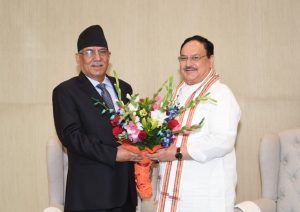India’s ruling Bharatiya Janata Party (BJP) is reaching out to Nepali political parties. It has been inviting Nepali politicians to build party-to-party ties.
On July 15, Pushpa Kamal Dahal, chairman of the Communist Party of Nepal-Maoist Center (CPN-MC), the second largest party in Nepal’s ruling coalition, arrived in New Delhi on a three-day visit on the invitation of BJP President J.P. Nadda. In April, Nepali Prime Minister Sher Bahadur Deuba visited the BJP’s headquarters during his visit to India, becoming the first sitting prime minister of Nepal to do so.
Dahal’s visit to New Delhi was more than just about building “party-to-party” relations. It had considerable political significance.
Before leaving Kathmandu, Dahal said, “the visit would be meaningful… for the government and ruling alliance.” At an event in New Delhi, he spoke of the need to review Nepal-India relations by accepting the report prepared by the Eminent Persons Group (EPG) and raised the issue of the 1950 treaty. He argued for reviewing the treaty and requested Indian Prime Minister Narendra Modi to “receive” the EPG report, which among other things recommends replacing the 1950 treaty and regulating the open border.
Besides Nadda, Dahal also met India’s Minister for External Affairs S. Jaishankar, Foreign Secretary Vinay Mohan Kwatra, and National Security Advisor Ajit Doval during his Delhi visit. He had hoped to meet Prime Minister Narendra Modi but that did not materialize. Dahal’s agenda, therefore, was more than building party-to-party relations.
The timing of his visit was significant too. It came just two days after the Chinese Communist Party (CCP) foreign liaison department chief, Liu Jianchao, visited Nepal.
Additionally, Nepal is scheduled to vote in general elections in November, and the national political scene is fluid. There is much debate within and across parties on forming pre-poll alliances and key among them is whether the current ruling coalition, which is led by the Nepali Congress and includes the CPN-MC will continue or if a “left alliance” will re-emerge. Dahal says the current coalition will continue, but he has a reputation for being ‘pragmatic’ or engaging in flip-flops.
New Delhi would like to see the continuation of the current ruling coalition. Nepal-India relation was at low ebb during the reign of a unified left, primarily due to Oli’s nationalist posturing and raising of the territorial dispute. Dahal will also provide a check on Deuba’s closeness with the U.S. New Delhi has been wary, though quiet, of increasing American presence in Nepal.
Dahal’s visit to New Delhi rectifies an important shortcoming in Nepal-India relations: the lack of political connections among crucial leaders. In the 1940s and 1950s, Indian and Nepali leaders had warm ties. However, such fraternal relations died down along with the death of that generation of leaders. The next generations of leaders were left with legacy connections.
The current leadership in Nepal lacks such personal relations. That was evident when Modi could not spare time to meet Dahal, despite the latter publicly articulating such expectations. Links with the BJP are even less because the party is a relatively new political force.
Without such political linkages, bureaucracies and intelligence agencies have taken over the key responsibilities in shaping India’s Nepal policy. This has resulted in sub-optimal relations between the two countries and has led to an increasing perception in Kathmandu that New Delhi does not treat Nepal as a sovereign equal.
In this context, the BJP’s outreach and engagement with Dahal sets a new tone.
India is not very fond of Dahal. As Maoist chief, Dahal often called India an imperialist power. He has accused New Delhi of orchestrating his ouster from the prime ministership in 2009.
By engaging him now, BJP has signaled that it is building bridges despite ideological differences.
Interestingly, both India and China are actively courting major Nepali political parties and politicians. Beijing is wooing Deuba, whereas New Delhi is courting Dahal. Nepal’s two giant neighbors have realized that Nepali politics is far too volatile for them to cultivate just one party to the exclusion of others. To ensure that their interests are continuously protected, they are engaging every major party.
However, party-to-party relations should be built upon, and complement, formal diplomatic processes. And in this, India is erring by downplaying diplomatic channels. The Nepali Ambassador to New Delhi, Shankar Sharma, had to wait more than a month to present his credentials after assuming the role. To date, Jaishankar and Kwatra have not acceded Sharma’s request for a courtesy meeting. New Delhi is entertaining political leaders but ignoring the official channels.
The Nepali government and all political parties have to tread cautiously. In the absence of principled diplomacy, the BJP (or the CCP) could use party-to-party linkages for influence peddling. Nepali leaders have often sought Indian help to further their personal interests. Party-to-party linkages, if they come at the cost of official institutions, could cost Nepal dearly.

































